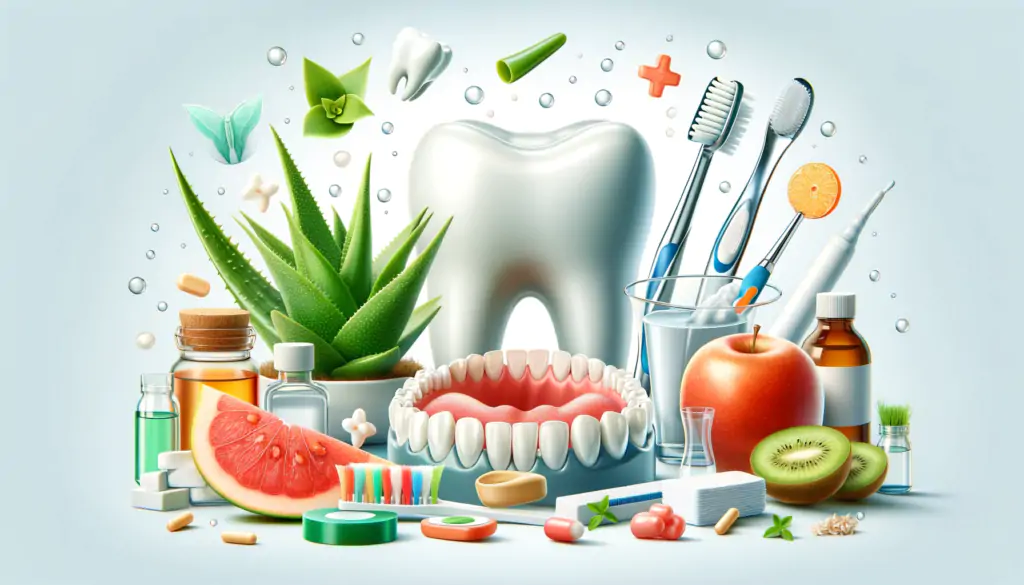5 Proven Strategies: How to Cure Gum Disease Without a Dentist
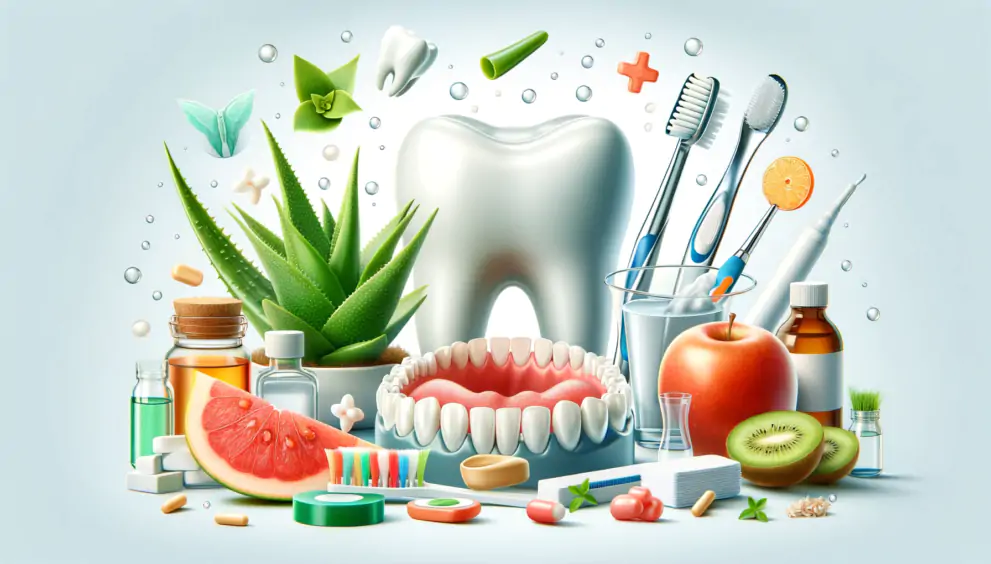
Table of Contents
Gum disease, a common yet often overlooked oral health issue, affects a significant portion of the population. It’s characterized by inflammation, swelling, and even bleeding of the gums, leading to discomfort and, in severe cases, more serious dental problems. The purpose of this article is to delve into the various aspects of gum disease, focusing primarily on how you can How to Cure Gum Disease Without a Dentist at home, without immediate intervention from a dentist. However, it’s crucial to understand that while many home remedies can be effective, they are not substitutes for professional dental care in severe cases.
Understanding Gum Disease

What is Gum Disease? Types and Symptoms
Gum disease, medically known as periodontal disease, is an infection of the tissues that hold your teeth in place. It’s typically caused by poor oral hygiene, leading to plaque buildup on teeth and gums. There are two main stages:
- Gingivitis: The earliest stage, characterized by red, swollen gums that may bleed easily.
- Periodontitis: Advanced gum disease, where gums pull away from the teeth, forming pockets that become infected.
The symptoms can vary, ranging from bad breath and red or swollen gums to tender or bleeding gums, painful chewing, and even loose teeth in advanced stages.
Causes of Gum Disease
Understanding the causes is crucial in preventing and treating gum disease. Key factors include:
- Poor Oral Hygiene: Not brushing or flossing regularly allows plaque to form on teeth and gums.
- Smoking: A significant risk factor for the development of gum disease.
- Hormonal Changes: Such as those occurring during pregnancy, menstruation, and menopause, make gums more sensitive.
- Medical Conditions: Diseases like diabetes affect the body’s ability to use blood sugar and can make gum disease worse.
- Medications: Certain medicines can reduce saliva flow, crucial for neutralizing acids produced by bacteria.
In the following sections, we will explore various ways on how to cure gum disease without a dentist, focusing on natural remedies, dietary changes, and lifestyle adjustments that can help in managing this condition effectively.
Home Remedies for Gum Disease
Daily Oral Hygiene Practices
Good oral hygiene is the cornerstone of preventing and managing gum disease. Here are some essential practices:
- Brushing and Flossing: Brush your teeth at least twice a day and floss daily to remove plaque.
- Right Tools: Use a soft-bristled toothbrush and fluoride toothpaste. Electric toothbrushes can be more effective in removing plaque.
- Technique Matters: Brush using circular motions, and don’t forget to brush your tongue to remove bacteria.
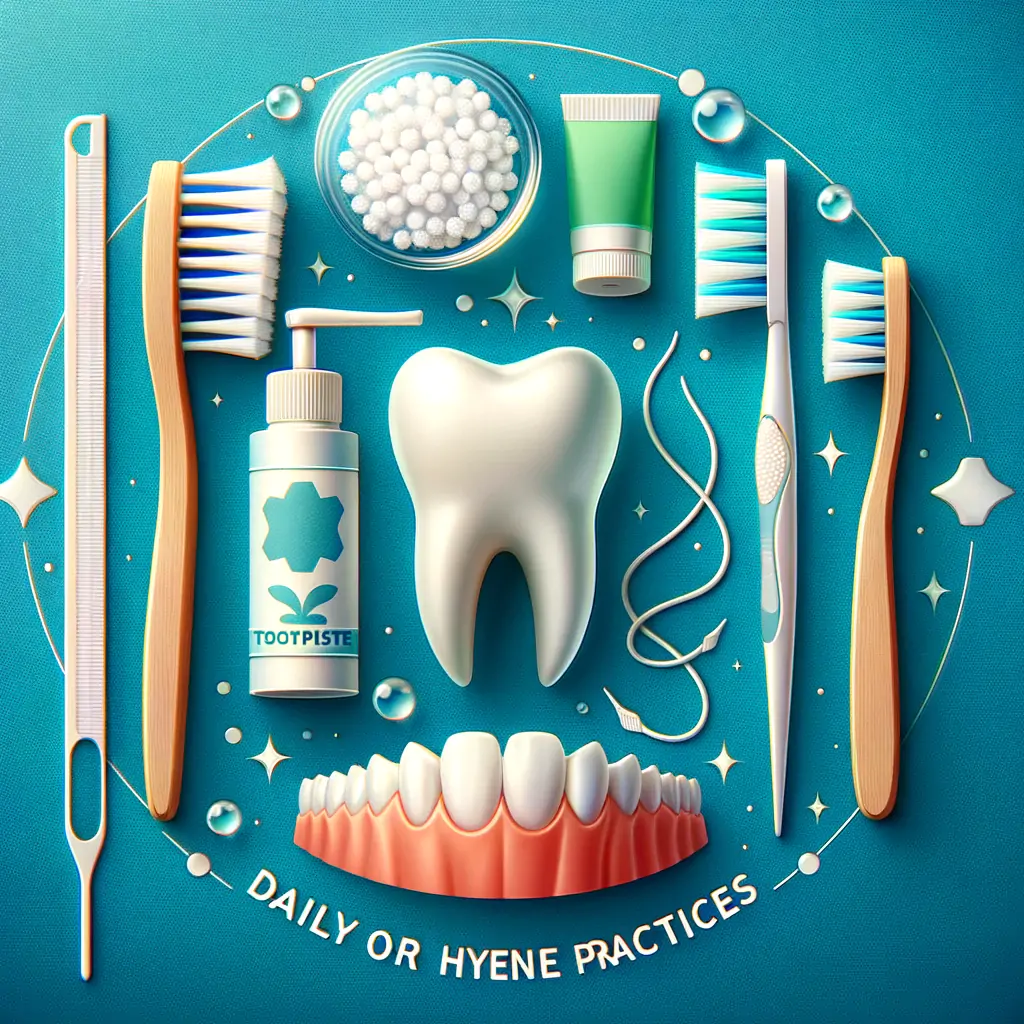
Natural Remedies for Healthier Gums
Nature offers several remedies that can help in managing gum disease. Here are some of the most effective ones:
- Saltwater Rinse: A natural disinfectant, saltwater can help reduce inflammation. Mix 1 tsp of salt in a cup of warm water and rinse your mouth for 30 seconds.
- Tea Tree Oil: Known for its anti-inflammatory properties, it can help reduce gum swelling. Add a drop to your toothpaste, but be cautious not to swallow it.
- Aloe Vera: A soothing agent, aloe vera can help in healing inflamed gums. Apply aloe vera gel to your gums and gently massage.
List of Natural Remedies:
- Saltwater rinse
- Tea tree oil
- Aloe vera gel
These remedies can provide relief and aid in the healing process, but it’s important to use them in conjunction with good oral hygiene practices.
Diet and Lifestyle Adjustments
Nutritional Support for Gum Health
Your diet plays a crucial role in oral health, particularly in the health of your gums. Here are some dietary tips:
- Vitamin C-Rich Foods: Foods like oranges, strawberries, and bell peppers boost gum health.
- Calcium-Rich Foods: Dairy products, leafy greens, and almonds strengthen teeth and bones.
- Avoid Sugary Foods: Sugar contributes to plaque and tartar build-up, exacerbating gum disease.

Beneficial Foods for Gum Health
| Food Type | Examples | Benefits |
| Vitamin C-Rich | Oranges, Kiwis, Strawberries | Boosts gum health |
| Calcium-Rich | Milk, Spinach, Almonds | Strengthens teeth |
| Crunchy Vegetables | Carrots, Celery | Natural teeth cleaners |
Lifestyle Changes to Prevent Gum Disease
Lifestyle adjustments can significantly impact the health of your gums:
- Quit Smoking: Smoking is a major risk factor for gum disease. Quitting smoking can improve oral health significantly.
- Stress Management: High stress levels can weaken your immune system, making it harder to fight off gum infection.
- Hydration: Drinking plenty of water helps keep your mouth clean and reduces plaque.
“A healthy diet and lifestyle are just as important for your teeth and gums as they are for the rest of your body.” – American Dental Association
Implementing these dietary and lifestyle changes can greatly reduce your risk of developing gum disease and improve your overall health.
Preventative Measures
The Importance of Regular Dental Check-ups
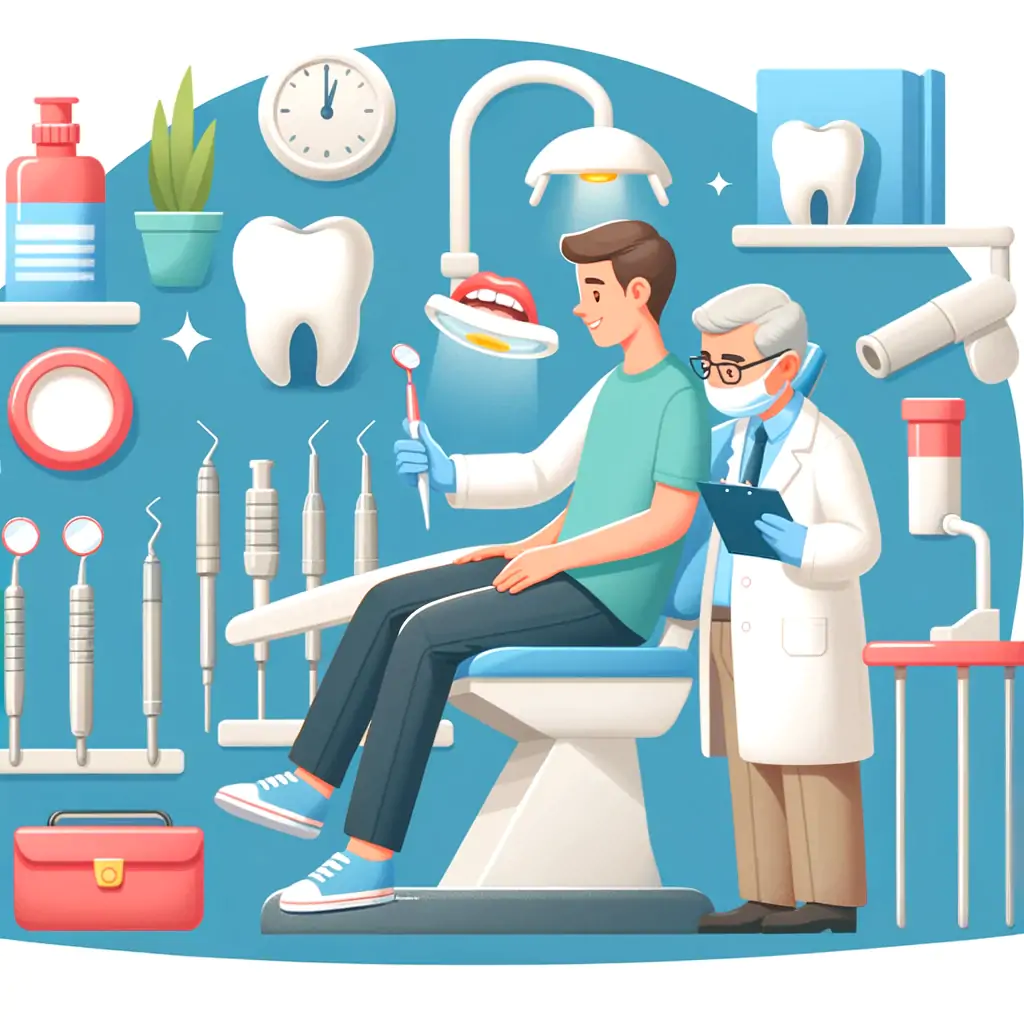
While home care is vital, regular professional dental check-ups play a crucial role in preventing gum disease:
- Early Detection: Regular dental visits help in the early detection of gum disease, making it easier to treat.
- Professional Cleaning: Dentists can remove plaque and tartar that can’t be cleaned at home.
Oral Hygiene Education
Educating yourself about proper oral hygiene techniques is key:
- Effective Brushing and Flossing: Learn the correct way to brush and floss to effectively remove plaque.
- Using Mouthwash: Incorporating an antimicrobial mouthwash can help reduce plaque and prevent gingivitis.
Tips for Effective Oral Hygiene:
- Brush twice a day for two minutes each time.
- Use floss or an interdental cleaner daily.
- Rinse with a mouthwash to reduce plaque bacteria.
A study by the American Dental Association found that individuals who had regular dental check-ups and followed proper oral hygiene practices were significantly less likely to develop severe gum disease.
These preventative measures, combined with a good home care routine, can significantly reduce the risk of developing gum disease.
Alternative and Complementary Therapies
Oil Pulling: An Ancient Practice
Oil pulling is an ancient technique that involves swishing oil in your mouth to remove bacteria and promote oral health.
- Method: Swish a tablespoon of coconut, sesame, or sunflower oil in your mouth for 15-20 minutes, then spit it out.
- Benefits: May reduce bacteria, decrease plaque, and improve gum health.
- Precautions: Do not swallow the oil, and continue regular brushing and flossing.
Herbal Remedies and Supplements
Certain herbs and supplements can support gum health:
- Neem: Known for its antibacterial properties, can be used in a mouth rinse.
- Turmeric: Contains curcumin, which has anti-inflammatory properties.
- CoQ10 and Omega-3 Supplements: These can help in reducing inflammation in the gums.
List of Herbal Remedies and Supplements:
- Neem (mouth rinse or toothpaste)
- Turmeric (as a paste or in supplements)
- CoQ10 and Omega-3 (supplements)
Alternative and Complementary Therapies
Oil Pulling: An Ancient Practice
Oil pulling is an ancient technique that involves swishing oil in your mouth to remove bacteria and promote oral health.
- Method: Swish a tablespoon of coconut, sesame, or sunflower oil in your mouth for 15-20 minutes, then spit it out.
- Benefits: May reduce bacteria, decrease plaque, and improve gum health.
- Precautions: Do not swallow the oil, and continue regular brushing and flossing.

Herbal Remedies and Supplements
Certain herbs and supplements can support gum health:
- Neem: Known for its antibacterial properties, can be used in a mouth rinse.
- Turmeric: Contains curcumin, which has anti-inflammatory properties.
- CoQ10 and Omega-3 Supplements: These can help in reducing inflammation in the gums.
List of Herbal Remedies and Supplements:
- Neem (mouth rinse or toothpaste)
- Turmeric (as a paste or in supplements)
- CoQ10 and Omega-3 (supplements)
Table: Benefits of Herbal Remedies for Gum Health
| Herbal Remedy | Form of Use | Benefits |
| Neem | Mouth rinse | Antibacterial, reduces plaque |
| Turmeric | Paste/Supplements | Anti-inflammatory, soothes gums |
| CoQ10 | Supplements | Reduces gum inflammation |
| Omega-3 | Supplements | Improves gum-to-tooth attachment |
While these therapies can be beneficial, they should not replace traditional oral care practices but rather complement them.
Recognizing When to See a Dentist
Limitations of Home Treatments
While home treatments can be effective for mild gum disease, they have their limitations. It’s important to recognize signs that require professional intervention:
- Persistent Symptoms: If symptoms like bleeding, swelling, or pain persist despite home care, it’s time to see a dentist.
- Worsening Condition: Increased tooth sensitivity or loosening teeth are signs of advancing gum disease.
The Risk of Untreated Gum Disease
Ignoring gum disease can lead to serious complications:
- Tooth Loss: Advanced gum disease can destroy the bone that supports teeth.
- Health Risks: Gum disease is linked to heart disease, diabetes, and other systemic health issues.
It’s crucial to balance home care with professional dental advice, especially in severe cases of gum disease.
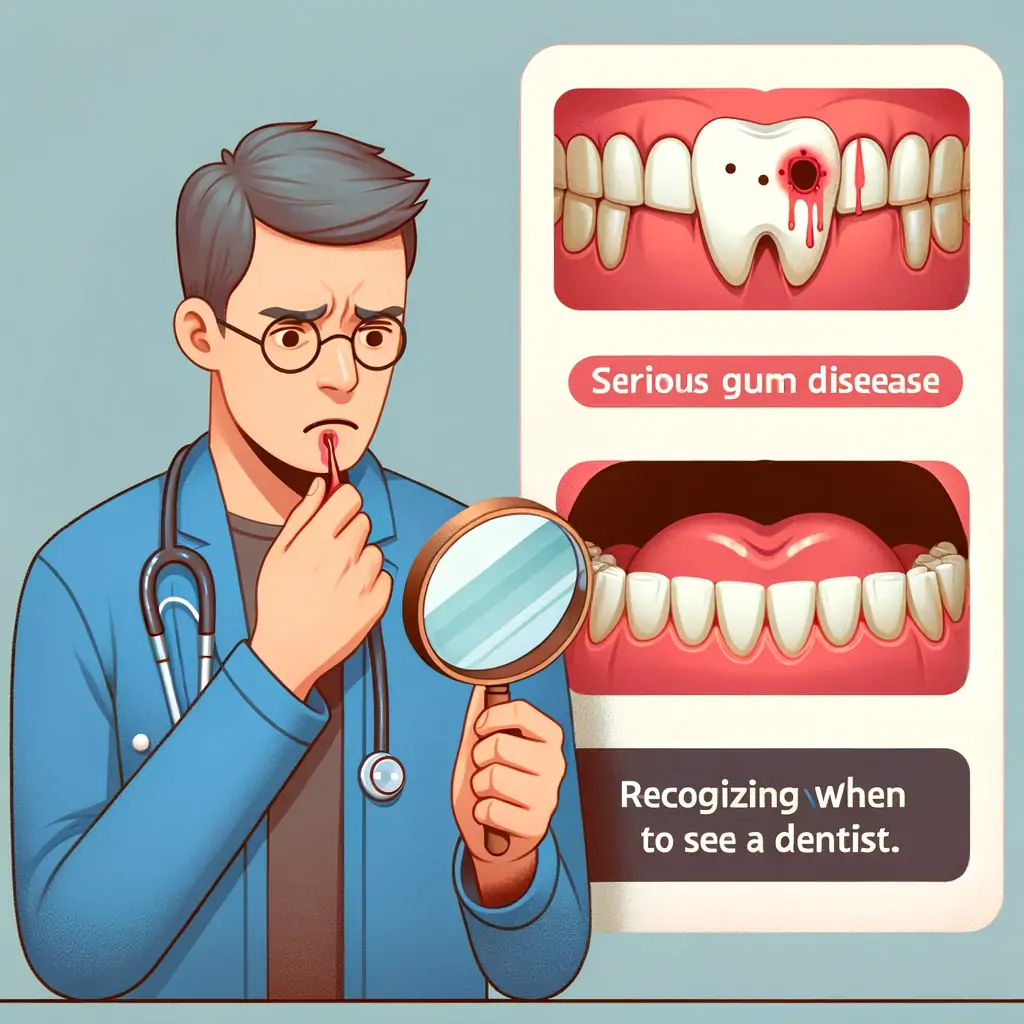
When to Visit a Dentist: A Checklist
- Bleeding gums that don’t improve with home care.
- Persistent bad breath or bad taste in the mouth.
- Receding gums or teeth appearing longer.
- Loose teeth or changes in the way your teeth fit together.
Seeking timely dental care can prevent the progression of gum disease and safeguard your overall oral health.
Conclusion : How to Cure Gum Disease Without a Dentist
In this comprehensive guide, we explored various aspects of managing gum disease without a dentist. From understanding the nature of gum disease and its causes to implementing home remedies, dietary changes, and lifestyle adjustments, we’ve covered a broad spectrum of strategies to combat this common oral health issue.
Remember, while many of these methods can be effective in preventing and treating mild gum disease, they should not replace professional dental care, especially in more severe cases. The key is to maintain a balance between home care and professional advice.
Recap of Key Points:
- Good Oral Hygiene: Regular brushing, flossing, and using mouthwash are essential.
- Natural Remedies: Saltwater rinses, tea tree oil, and aloe vera can help alleviate symptoms.
- Dietary Adjustments: Consuming vitamin C and calcium-rich foods, and avoiding sugary foods, support gum health.
- Lifestyle Changes: Quitting smoking and managing stress contribute to healthier gums.
- Regular Dental Check-ups: Essential for early detection and treatment of gum disease.
- Alternative Therapies: Practices like oil pulling and herbal remedies can complement traditional care.
- Professional Care: Recognizing when to seek a dentist’s help is crucial.
Taking proactive steps towards maintaining good oral health can make a significant difference in preventing and managing gum disease. Remember, a healthy mouth is a gateway to a healthy body, so take care of your gums as you would any other part of your health.
Resources and References
- American Dental Association (ADA) – Gum Disease Information
- ADA – Gum Disease
- Provides comprehensive information on gum disease, its types, symptoms, and treatments.
- National Institute of Dental and Craniofacial Research – Periodontal (Gum) Disease
- NIDCR – Periodontal Disease
- Offers detailed scientific and research-based information on periodontal disease.
- Mayo Clinic – Gum Disease
- Mayo Clinic – Gum Disease
- Provides medical insights on symptoms, causes, risk factors, and more related to gum disease.
- WebMD – Home Remedies for Gum Disease
- WebMD – Gum Disease Home Remedies
- Focuses on home remedies and lifestyle changes for managing gum disease.
- Healthline – Natural Remedies for Gum Disease
- Healthline – Natural Remedies
- A resource for natural and alternative treatments for gum disease.
Frequently Asked Questions
Q1: Can gum disease really be cured at home?
A1: Mild forms of gum disease, like gingivitis, can often be managed and reversed with diligent home care, including proper oral hygiene and natural remedies. However, more advanced stages like periodontitis require professional dental treatment.
Q2: How long does it take to see improvements in gum health with home remedies?
A2: Improvement times can vary depending on the severity of the gum disease and how consistently the home remedies are applied. Some people may notice improvements within a few weeks, while others might take longer.
Q3: Are there any side effects to using natural remedies for gum disease?
A3: Most natural remedies like saltwater rinses and aloe vera are safe, but it’s important to use them as directed. For instance, swallowing tea tree oil can be harmful, so caution is necessary.
Q4: How can diet affect gum disease?
A4: A diet rich in vitamins, particularly vitamin C, and minerals like calcium can strengthen gums and teeth. Conversely, a diet high in sugar can exacerbate gum disease by promoting plaque formation.
Q5: Is oil pulling scientifically proven to help with gum disease?
A5: Oil pulling is a traditional remedy with anecdotal support, and some studies suggest it can reduce bacteria and plaque. However, it should not replace brushing and flossing but rather be used as a complementary practice.
Q6: Can stress really impact gum health?
A6: Yes, high stress can weaken the immune system, making it harder for your body to fight off the bacteria that cause gum disease.
Q7: When should I definitely see a dentist for gum disease?
A7: If you experience persistent symptoms like bleeding, pain, loose teeth, or receding gums, it’s important to visit a dentist for a professional assessment and treatment.
Q8: How effective are herbal remedies like turmeric and neem for gum disease?
A8: Turmeric and neem have anti-inflammatory and antibacterial properties, which can be beneficial for gum health. However, they should be used as part of a broader oral care routine.
Q9: Can quitting smoking really improve my gum health?
A9: Yes, smoking is a major risk factor for gum disease. Quitting can significantly improve your oral health and reduce the risk of developing gum disease.
Q10: Are there any specific toothpastes you recommend for gum disease?
A10: Toothpastes containing fluoride and specially formulated for gum health can be beneficial. Look for products with anti-gingivitis properties or those designed for sensitive teeth and gums.
 English
English 


